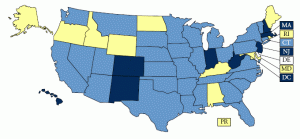Medicare Beneficiaries’ and Unemployment Payments Reinstated
Medicare beneficiaries were facing payment cuts of 21.2% due to the changes in the Medicare physician fee schedule. The bill reinstated them to the level they were at on March 31, and postponed the 2010 cuts . The President’s signed it yesterday.
H.R. 4851 also includes language that would modify the Health Information Technology for Economic and Clinical Health (HITECH) Act to allow physicians who provide a majority of their Medicare-covered professional services in the hospital outpatient setting to be eligible for Medicare electronic health record (EHR) incentive payments. In its December EHR meaningful use proposed rule, CMS, proposed that physicians who furnish at least 90 percent of their services in a hospital setting, either inpatient or outpatient, would not be eligible for the EHR Medicare incentive payment. ASGE supports the modification to the HITECH Act as included in H.R. 4851
As of April 5, 2010, unemployed people who had exhausted their states’ jobless benefits were unable to receive additional benefits under the federal program. On Thursday, April 15, 2010, President Obama signed H.R. 4851, the Continuing Extension Act of 2010, legislation to provide up to 99 weekly unemployment checks averaging $335 to people whose 26 weeks of state-paid benefits have run out. When unemployment benefits do run out, it artificially boosts the employment rate (or lowers the unemployment rate), since these workers do not appear in any statistics.
Some of the major provisions include:
Continuing Extension Act of 2010 – (Sec. 2) Amends the Supplemental Appropriations Act, 2008 with respect to the state-established individual emergency unemployment compensation account (EUCA). Extends the final date for entering a federal-state agreement under the Emergency Unemployment Compensation (EUC) program through May 5, 2010. Postpones the termination of the program until October 2, 2010.
Amends the Assistance for Unemployed Workers and Struggling Families Act to extend until May 5, 2010: (1) federal-state agreements increasing regular unemployment compensation payments to individuals; and (2) requirements that federal payments to states cover 100% of EUC.
Amends the Unemployment Compensation Extension Act of 2008 to exempt weeks of unemployment between enactment of this Act and October 2, 2010, from the prohibition in the Federal-State Extended Unemployment Compensation Act of 1970 against federal matching payments to a state for the first week in an individual’s eligibility period for which extended compensation or sharable regular compensation is paid if the state law provides for payment of regular compensation to an individual for his or her first week of otherwise compensable unemployment. (Thus allows temporary federal matching for the first week of extended benefits for states with no waiting period.)
(Sec. 3) Amends the American Recovery and Reinvestment Act of 2009 to extend through April 30, 2010, premium assistance for COBRA benefits (health insurance continuation benefits under the Consolidated Omnibus Budget Reconciliation Act of 1985).
(Sec. 4) Amends title XVIII (Medicare) of the Social Security Act (SSA) to extend through April 30, 2010: (1) the 0% update to the conversion factor in the Medicare physician payment computation; and (2) the Medicare physical therapy services caps exceptions process.
(Sec. 6) Amends SSA title VIII (Medicare) and title XIX (Medicaid) with respect to the prohibition against incentive payments to hospital-based eligible professionals for use of certified electronic health record (EHR) technology. Redefines “hospital-based eligible professional” to repeal its application to outpatient settings, thereby permitting incentive payments to an eligible professional who furnishes services in an outpatient clinic.



